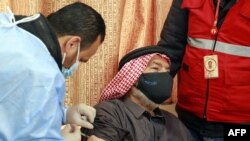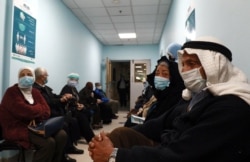Jordan's king has joined calls from U.N. agencies urging global vaccine equity to halt the spread of COVID-19.
Jordan has fared far better than neighboring Iraq and Syria in protecting lives during the coronavirus pandemic. COVID-19 infections barely registered at the start of the outbreak a year ago, and the important U.S. Middle East ally only experienced its first wave in autumn of last year.
Jordan is now in the grips of a second wave but is rushing to vaccinate citizens, refugees, and foreign residents alike, free of charge.
In remarks to the Brookings Institution, Jordan's King Abdullah said that nobody can be left behind in combating COVID-19, and vaccinations are key to avoiding further tragedy and high mortality rates around the world.
"We have included refugees in our national COVID response and vaccine distribution plan," he said. "Even if the stories of refugees have slipped from the 24-hour news cycle, the world must be reminded that the crisis is far from over. Supporting the international agencies at the forefront of relief efforts — the World Health Organization, the UNHCR and UNRWA — is essential to enable them to assist vulnerable communities in averting the far-reaching implications of the pandemic on health, livelihoods, education and food security."
The U.N. refugee agency says refugees from neighboring conflicts make up 30 percent of Jordan's population, and some 80 percent have integrated into Jordan's urban communities.
Refugees living in urban areas are vaccinated at their local health clinics independently of UNHCR, and the agency does not know how many have received the vaccine.
For those living in the two main refugee camps, UNHCR is working closely with Jordan's Ministry of Health to administer the vaccine.
"We actually only know the number of refugees vaccinated in the camps — a total of 488 refugees," said Lilly Carlisle, UNHCR's Jordan spokesperson.
Rula Amin, UNHCR's spokesperson for the Middle East and North Africa, says about 86 percent of refugees live in developing countries and help is needed to ensure they can be vaccinated, as they are among the most vulnerable of any population.
"For these countries to be able to include refugees in the roll-out plans of the vaccinations and actually give them full access to these vaccinations, they need support as well from the international community," Amin said. "And they need support to be able to acquire the vaccines, administer the vaccines, and respond to this moment in the most efficient way."
According to the latest data from Johns Hopkins University, Jordan has experienced more than 440,000 cases of coronavirus and more than 5,000 deaths. About 3 percent of its 10 million people have been fully vaccinated.





